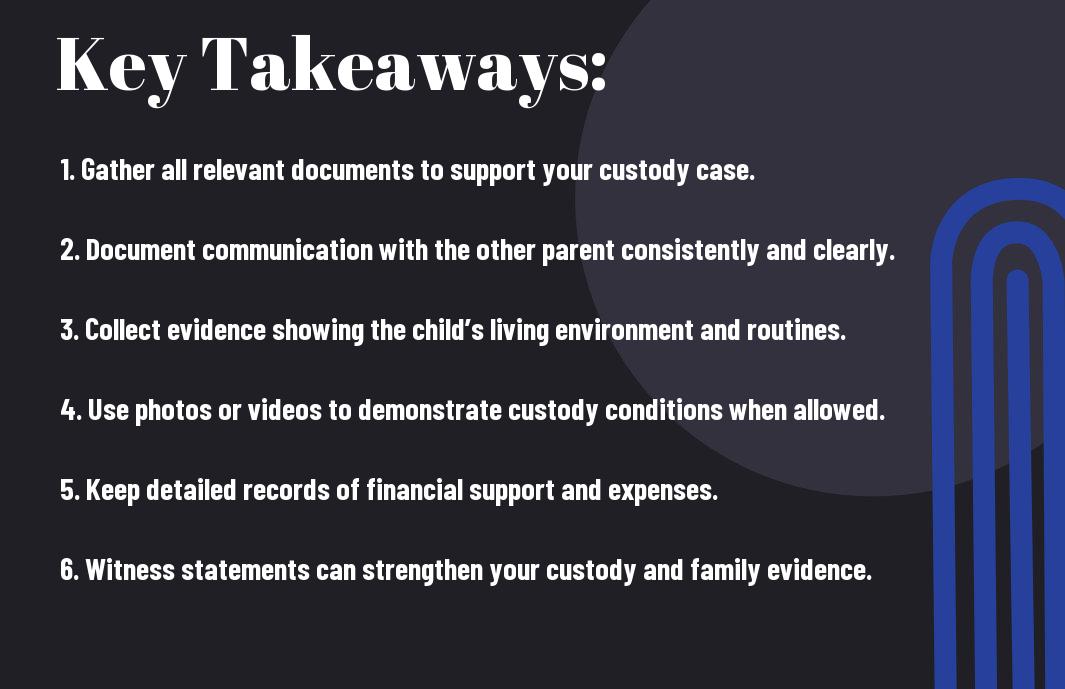Evidence plays a vital role in family and custody cases, significantly influencing the outcome of your legal journey. Understanding what types of evidence are relevant can empower you to build a strong case that protects your rights and ensures the best outcome for your family. From documentation and witnesses to digital communications, knowing how to gather and present your evidence is vital. This guide will walk you through the basics of family and custody evidence, helping you navigate this complex area with confidence and clarity. Visit Digital Forensic Squad to learn more about applications of digital forensics in custody cases.
Key Takeaways:
- Understanding the types of evidence needed in family and custody cases is necessary for building a strong case, including documentation such as financial records, communication logs, and witness statements.
- Organizing and presenting evidence clearly can significantly impact the outcome of custody decisions; proper labeling and categorization of evidence can enhance its effectiveness in court.
- Consulting legal professionals who specialize in family law can provide valuable insights on the collection and admissibility of evidence, ensuring that all necessary information is effectively utilized in custody proceedings.

Understanding Family and Custody Evidence
For anyone navigating family law, a strong grasp of family and custody evidence is vital. This type of evidence plays a key role in determining custody arrangements, influencing the courts’ decisions about your children’s best interests. Knowing how to collect, present, and argue your evidence can significantly affect the outcome of custody proceedings.
Importance of Evidence in Custody Cases
Evidence can profoundly impact custody cases by establishing a parent’s fitness, the child’s well-being, and the overall family dynamics. It strengthens your case by providing factual support for your claims or concerns, allowing the court to make informed decisions that prioritize your child’s best interests.
Types of Family and Custody Evidence
Any custody case can benefit from a variety of evidence types that can help you effectively present your argument. Consider the following:
| Witness Testimony | Statements from family, friends, or professionals familiar with family dynamics. |
| Documentary Evidence | Legal documents, school records, and medical reports supporting your case. |
| Photographic Evidence | Photos depicting living conditions and interactions between you and your child. |
| Communication Records | Text messages, emails, or voicemail recordings relevant to custody matters. |
| Expert Evaluations | Reports from psychologists or social workers assessing family dynamics. |
Assume that gathering and presenting all these types of evidence strengthens your position in custody proceedings.
Due to the complexity of custody cases, different types of evidence may be necessary to illustrate your position effectively. Here are some key types of evidence to consider:
| Monitoring Reports | Records from supervised visitations can indicate the child’s comfort and safety. |
| School Performance | Evidence of your child’s academic progress or struggles which affects custody decisions. |
| Financial Records | Documents that show your ability to provide a stable environment. |
| Health Records | Medical documentation attesting to any ongoing health issues the child may have. |
| Personal Journals or Logs | Notes documenting interactions and behaviors over time. |
Assume that utilizing various evidence types enhances your credibility and supports your arguments during custody battles.

Gathering Evidence for Your Case
Even when you think you have a solid case, the strength of your family and custody evidence can make all the difference. Effective evidence gathering provides the foundation for your case and enhances your credibility in court. It’s crucial to be thorough and organized, as the right information can lead to a favorable outcome in your custody dispute.
Documentation and Records
Across various aspects of your life, you should compile as much relevant documentation and records as possible. This includes school reports, medical records, and communication logs, all of which can substantiate your claims. Organizing and presenting these documents clearly will bolster your position and support your narrative effectively.
Witness Testimonies
Along with documentation, witness testimonies can significantly enhance your case. Having credible witnesses who can speak to your parenting abilities, character, or the child’s needs will add weight to your arguments. These individuals can provide firsthand accounts that resonate with the court’s concerns.
In addition, you should focus on identifying witnesses who have a direct connection to your family life—such as teachers, neighbors, or family friends. Their assertive observations can illustrate your relationship with your child and reveal pertinent details highlighting your parenting style. When preparing your witnesses, ensure they are well-informed about your situation and encourage them to remain honest and objective during testimony. The right testimonies can amass considerable influence in court, presenting a well-rounded perspective of your capabilities as a parent.
Legal Standards for Admissibility
Unlike common assumptions, not all evidence is admissible in court. To learn more about the specific legal standards, you can explore Books – Family Law: A Beginner’s Guide that provide in-depth insights. Understanding these standards will prepare you for presenting your case effectively and ensuring that your evidence is considered by the court.
Relevance and Reliability
Along with legal standards, your evidence must be both relevant and reliable. Relevant evidence directly relates to the case matters at hand, while reliability pertains to the trustworthiness of that evidence. When assembling your evidence, ensure it addresses the specific custody or family law issues relevant to your situation.
Local Laws and Guidelines
Legal guidelines can vary significantly between jurisdictions, affecting what is considered admissible evidence in your custody case. Each state has its own rules about evidence presentation in family law cases, which is why you should familiarize yourself with local regulations.
And navigating these local laws is imperative for presenting a strong case. Some jurisdictions may have specific requirements for documentation and witness testimony. By adhering to your state’s guidelines, you enhance the reliability of your evidence and increase its chances of being accepted in court. Failure to comply with these regulations may lead to a negative impact on your case’s outcome, so it’s vital to stay informed and consult local legal resources.
Presenting Evidence in Court
Now that you’ve gathered your evidence, it’s time to present it in court effectively. The way you present your evidence can significantly influence the outcome of your case. Each piece of evidence must be clearly articulated, demonstrating its relevance and supporting your arguments. You should practice your presentation to ensure that it is both persuasive and clear.
Organizing Your Evidence
Among the first steps in effective evidence presentation is organizing your materials. Group your evidence by category, such as financial records, text messages, or witness statements. Create a logical flow that makes it easy for the court to follow your arguments. This organization not only helps you but also aids the judge and jury in understanding your case.
Effective Presentation Techniques
Beside organization, utilizing effective presentation techniques is crucial. Use visuals whenever possible to enhance your narrative. When presenting, speak clearly and confidently, maintaining eye contact with the judge and opposing parties. This can aid in demonstrating your credibility, making your arguments more engaging and easier to follow.
Even simple techniques like using visual aids, such as charts or photographs, can strengthen your case. Visual elements can break down complex information, making it more relatable and understandable. Additionally, practicing your delivery gives you the confidence to speak clearly and maintain control of your emotions. Engaging your audience ensures they cannot only hear your arguments but also feel their weight. Effective presentation can be the difference between being heard and making a lasting impact in court.
Common Challenges and How to Overcome Them
After you launch on the journey of gathering family and custody evidence, you may encounter various challenges that can weigh heavily on your case. By being aware of these obstacles and having strategies in place, you can navigate them more effectively. From dealing with uncooperative parties to addressing misinformation, understanding the landscape will empower you to build a stronger case that supports your family’s best interests.
Dealing with Uncooperative Parties
Any interactions with uncooperative individuals can be frustrating and may impede your progress. It’s vital to remain calm and professional, documenting all communications. Consider involving a mediator or legal professional to facilitate discussions. By maintaining a firm yet amicable stance, you can encourage cooperation while protecting your interests.
Addressing Misinformation
Before you proceed with your case, it’s vital to address any misinformation that could affect your credibility. Gather factual evidence to counter any false claims and present your findings clearly to ensure accurate communication.
Uncooperative parties can significantly complicate your situation. In these instances, effective communication becomes vital—document every conversation, as keeping a record can serve as critical evidence. Utilizing a neutral third party, like a mediator, can help facilitate discussions, ensuring that everyone’s voice is heard. By staying professional and focused on your objective, you may influence unwilling individuals to cooperate, which can lead to a more favorable outcome for your case.
Resources and Tools for Parents
Despite the emotional challenges of navigating family and custody evidence, a wealth of resources and tools can support you. These aids can empower you to build a solid case and understand your rights and obligations as a parent. From books and articles to online platforms and support groups, these resources are invaluable for guiding you through this complex process.
Recommended Books and Articles
Above all, engaging with well-researched books and articles can provide you with vital insights into family law and custody matters. Look for publications authored by experienced legal professionals or those that focus specifically on your state’s laws. These texts will become useful references as you prepare for your custody proceedings.
Online Resources and Support Groups
Resources like forums, websites, and support groups offer you a chance to connect with others in similar situations. They provide relevant information, shared experiences, and emotional support, helping you to better navigate your custody journey.
Also, joining online support groups can significantly enhance your understanding of the family court system. You will find that many groups share valuable information on local laws and upcoming changes to legislation. Engaging with others can lead to discovering personal stories that resonate with you and provide actionable tips. Additionally, these networks can offer emotional support, helping you manage the stress associated with custody issues.
Summing up
On the whole, “The Ultimate Beginner’s Guide to Family & Custody Evidence” provides you with crucial knowledge and tools to navigate the complexities of family and custody cases. Armed with this guide, you can effectively gather, organize, and present your evidence to better support your position during legal proceedings. By understanding the types of evidence and their importance, you can feel more confident and empowered as you advocate for the best interests of your family.
FAQ
Q: What types of evidence are most important in family and custody cases?
A: In family and custody cases, various types of evidence can play a significant role. Some of the most important include documentation of living conditions, proof of parental involvement, communication records (such as text messages or emails), and character references from friends or family members. Additionally, any evidence that demonstrates a parent’s ability to provide a stable environment for the child, like financial statements or proof of employment, can be beneficial during proceedings.
Q: How can I gather evidence effectively for my family or custody case?
A: To gather evidence effectively, start by organizing all relevant documentation in one place. This can include legal documents, photographs, and written correspondence. Be methodical about collecting evidence: keep a record of dates and events, and take notes on conversations and interactions that pertain to the custody arrangement. If possible, enlist the help of a professional, such as a lawyer or private investigator, who can provide guidance on what types of evidence will be most beneficial for your specific situation. Visit Digital Forensic Squad to learn more about applications of digital forensics in custody cases.

